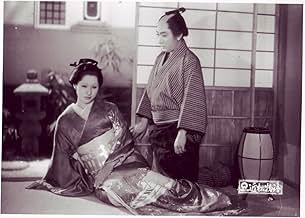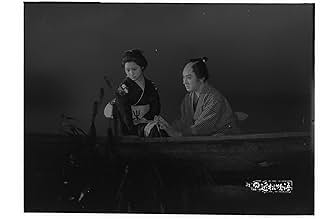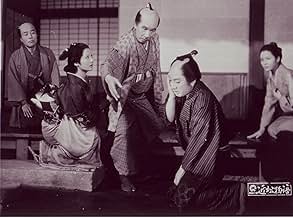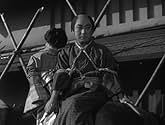PUNTUACIÓN EN IMDb
8,0/10
5,3 mil
TU PUNTUACIÓN
Ishun es un rico escribano que acusa falsamente a su esposa y su mejor empleado de tener una aventura.Ishun es un rico escribano que acusa falsamente a su esposa y su mejor empleado de tener una aventura.Ishun es un rico escribano que acusa falsamente a su esposa y su mejor empleado de tener una aventura.
- Dirección
- Guión
- Reparto principal
- Premios
- 1 premio y 2 nominaciones en total
Eitarô Ozawa
- Sukeemon
- (as Sakae Ozawa)
Reseñas destacadas
I saw this over 20 years ago and I remember it well. Superb photography. Great acting by the 2 leads. How things were different in that era compared to today in Japan. This is probably very hard to find on video if it exists at all. But you may see it in art houses like I did. Another Mizoguchi classic. If you like his work, I recommend The Human Condition, the greatest film ever made.
This film was near the end of a wonderful sequence of films made near the end of his life by Mizoguchi. As Tony Raines says in the DVD extra for the Masters of Cinema edition this was a studio project that he was not wholly enthusiastic about. This shows a little in the film as it lacks some of the real flair and emotional power of some of his earlier great films. However, it shares with them his wonderful flowing camera and great cinematography. Its also a terrific story, based originally on a story from the great Japanese 17th Century playwright Monzaemon Chikamatsu (hence the Japanese name, A Tale from Chikamatsu). The screenplay is skillfully worked from the original story, which depends a lot of some pretty unlikely coincidences.
The film has a great cast, although the lead actor (and major star at the time) Kazuo Hazegawa is a little old for the role of the shy lover. Kyoko Kagawa is great as the wife of a powerful merchant who is mistakenly accused of having an affair with her servant, but then falls in love with him as they both go on the run.
As you'd expect from a Mizoguchi film, technically it is flawless, with lovely sets and some beautiful camera work. The Masters of Cinema version on DVD is a beautiful restoration. For Mizoguchi fans, this film is well worth getting, but for those who haven't seen many of his films it would be better to start with some of his earlier masterpieces.
The film has a great cast, although the lead actor (and major star at the time) Kazuo Hazegawa is a little old for the role of the shy lover. Kyoko Kagawa is great as the wife of a powerful merchant who is mistakenly accused of having an affair with her servant, but then falls in love with him as they both go on the run.
As you'd expect from a Mizoguchi film, technically it is flawless, with lovely sets and some beautiful camera work. The Masters of Cinema version on DVD is a beautiful restoration. For Mizoguchi fans, this film is well worth getting, but for those who haven't seen many of his films it would be better to start with some of his earlier masterpieces.
The only print of CHIKAMATUS MONOGATARI I've been able to find was abysmal - I almost couldn't watch it. Which is a shame as this is among the greatest Mizoguchi films. The story - which I believe had been done before and since by other Japanese directors - is a bit straighter than my favorite Mizoguchi films (SANSHO THE BAILIFF and UGETSU MONOGATARI), and is essentially a tale of tragic romance, in this case a transgressive romance that crosses strict class boundaries. As always with Mizoguchi, there is an exquisitely expressed tone of defiance, and - bad print aside - I was very pleased. As with all of Mizoguchi's films, I'm eagerly awaiting a restored DVD release - whenever that may come...
"Chikamatsu Monogatari" (Crucified Lovers) (Japanese, 1954): Set in 17th century Japan, a series of honorable gestures begins to go terribly wrong, and takes victims with them. Did you know that adulterers at that time were crucified in Japan? This and many more traditions of the Old Way were up for reexamination by the Japanese culture soon after their defeat in World War II. This must have been a time of great doubt for them after all, wasn't it their past that lead them to their current condition? "Chikamatsu Monogatari" is an elegant, methodical story with tragic twists and turns that never the less head straight into inflexible Fate.
I think this makes it official: no major filmmaker ever utilized lakes as well as did Kenji Mizoguchi. Between the canoe chase in Sansho the Bailiff and the suicide attempt seen in this film, it can safely be said that the Japanese director was the cinematic master of lake imagery.
The images here, by Mizoguchi and DP Kazuo Miyagawa, who also lensed many of Kurosawa's most iconic films, are consistently gorgeous. More than that, though, Chikamatsu is, I think, the most perfect encapsulation of Mizoguchi's central theme: the self-annihilating ecstasy that comes with turning one's back on an unjust social order.
Perhaps "encapsulate" is a particularly good word to use because one of the reasons the themes are so brazen is that Mizoguchi is here working on a far smaller canvas than he usually allows himself. This film is quite short by the director's standards, and deals with a smaller number of characters. Perhaps because of its less epic scope I would rank it just below the previously mentioned Sansho the Bailiff as my favorite film by this great director.
The images here, by Mizoguchi and DP Kazuo Miyagawa, who also lensed many of Kurosawa's most iconic films, are consistently gorgeous. More than that, though, Chikamatsu is, I think, the most perfect encapsulation of Mizoguchi's central theme: the self-annihilating ecstasy that comes with turning one's back on an unjust social order.
Perhaps "encapsulate" is a particularly good word to use because one of the reasons the themes are so brazen is that Mizoguchi is here working on a far smaller canvas than he usually allows himself. This film is quite short by the director's standards, and deals with a smaller number of characters. Perhaps because of its less epic scope I would rank it just below the previously mentioned Sansho the Bailiff as my favorite film by this great director.
¿Sabías que...?
- CuriosidadesThe movie is based on a play by the classic Japanese author Monzaemon Chikamatsu (1653-1725). The original title "Chikamatsu monogatari" means "A Tale From Chikamatsu".
- ConexionesFeatured in Histoire(s) du cinéma: Toutes les histoires (1988)
Selecciones populares
Inicia sesión para calificar y añadir a tu lista para recibir recomendaciones personalizadas
- How long is A Story from Chikamatsu?Con tecnología de Alexa
Detalles
- Fecha de lanzamiento
- País de origen
- Idioma
- Títulos en diferentes países
- A Story from Chikamatsu
- Empresa productora
- Ver más compañías en los créditos en IMDbPro
Taquilla
- Recaudación en todo el mundo
- 9311 US$
- Duración
- 1h 42min(102 min)
- Color
- Relación de aspecto
- 1.37 : 1
Contribuir a esta página
Sugerir un cambio o añadir el contenido que falta

































